Recent Articles
Popular Makes
Body Types
2018 Honda Ridgeline vs. 2018 Chevrolet Colorado: Which Is Best?
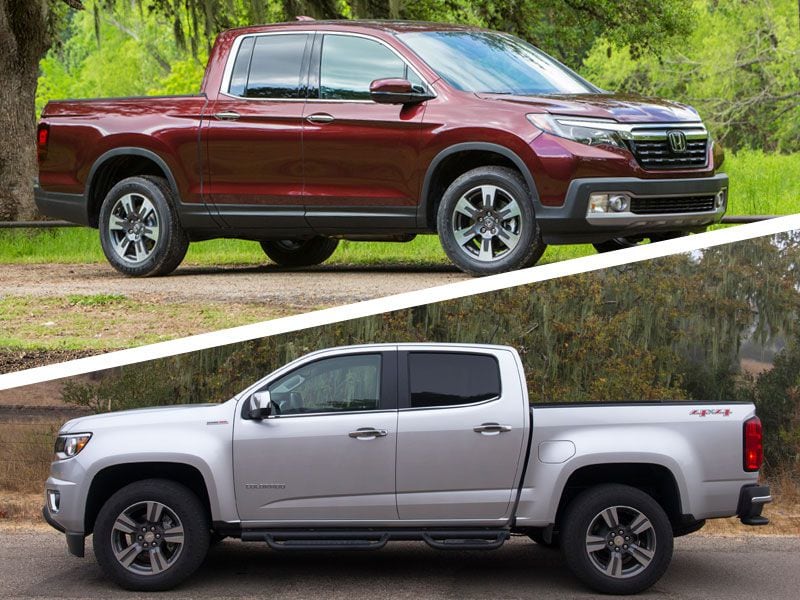
2018 Honda Ridgeline vs Chevrolet Colorado ・ Photo by Honda / General Motors
The compact truck market has been picking up steam in the last few years after a decade or two of relative stagnation. Honda is offering the latest version of its Ridgeline (which was redesigned for the 2017 model year), General Motors is offering the Chevrolet Colorado and GMC Canyon (with both due for a slight refresh in the next year or two), the Toyota Tacoma and Nissan Frontier are still around, and next year brings the re-introduction of the Ford Ranger.
At the moment at least the Ridgeline and the Colorado are two of the better compact trucks on the market, so let’s see what they bring to the table and which option is best for your needs.
Design
The Honda Ridgeline uses a more modern and car-like unibody style design, where the truck gets most of its structural integrity from the body panels themselves. The only available configuration is a crew cab with a 64-inch bed.
The Chevrolet Colorado on the other hand still follows truck tradition with a traditional body on frame design, where the body is attached to a steel "backbone" that supports the vehicle’s weight. It’s available as an extended cab with a 74-inch bed or as a crew cab with either a 61.7-inch or 74-inch bed. The ZR2 is an off-road ready version of the Colorado with a 2-inch lift, Multimatic shocks, front and rear diff lockers, and 31-inch tires.
Tie
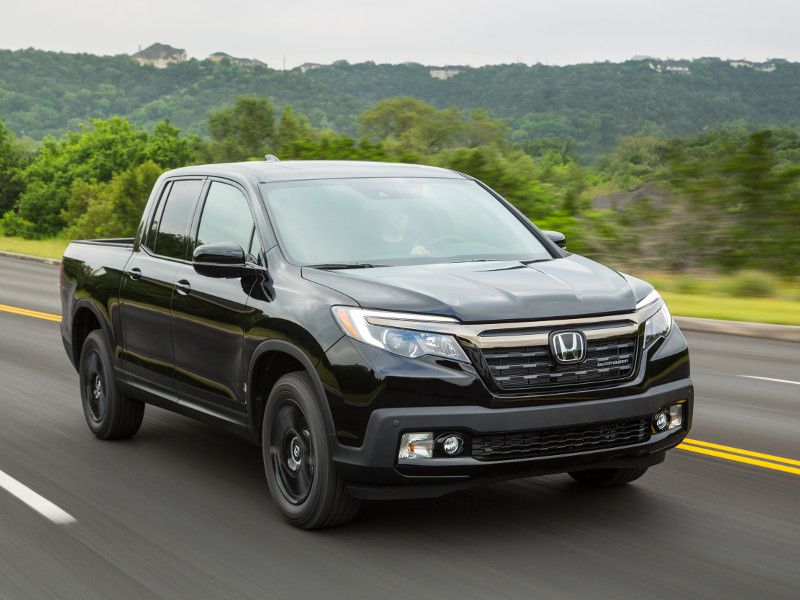
Photo by Honda
Engines and Fuel Economy
All Honda Ridgelines are powered by a 3.5-liter V6 that generates 280 horsepower and 262 lb-ft of torque, which is sent to the wheels via a six-speed automatic transmission. Fuel economy is rated at 22 miles per gallon combined for front-wheel drive models and 21 mpg combined for all-wheel drive versions.
The Chevrolet Colorado on the other hand offers three different engine options: a 200-horsepower 2.5-liter four-cylinder (22 mpg combined for both the six-speed manual and six-speed automatic rear-wheel drive models, and 21 mpg for four-wheel drive models); a 308-horsepower 3.6-liter V6 (20 mpg for rear-wheel drive, 19 mpg for four-wheel drive); and a 181-horsepower 2.8-liter turbodiesel (25 mpg for rear-wheel drive, 23 mpg for four-wheel drive).
Chevrolet Colorado
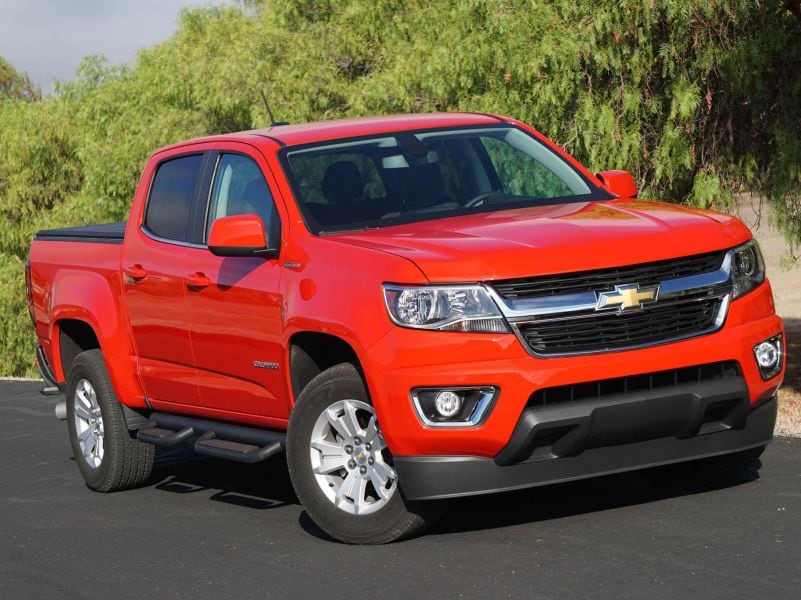
Photo by General Motors
Transmission and Drive Options
The Honda Ridgeline reveals some of its more car-based design in its powertrain configurations, offering either front-wheel drive or all-wheel drive configurations, both of which come only with a six-speed automatic transmission. Rear-wheel drive or a manual transmission just aren’t in the cards with a Ridgeline.
Conversely, like most pickups, the Chevrolet Colorado offers a choice of either rear-wheel or four-wheel drive, and four-cylinder models offer a choice between a six-speed manual or six-speed automatic transmission. Unfortunately, the V6 can only be paired with an eight-speed automatic while the diesel has to make do with a six-speed auto, though rumor has it that an eight-speed automatic might be coming for the diesel in 2019.
Chevrolet Colorado
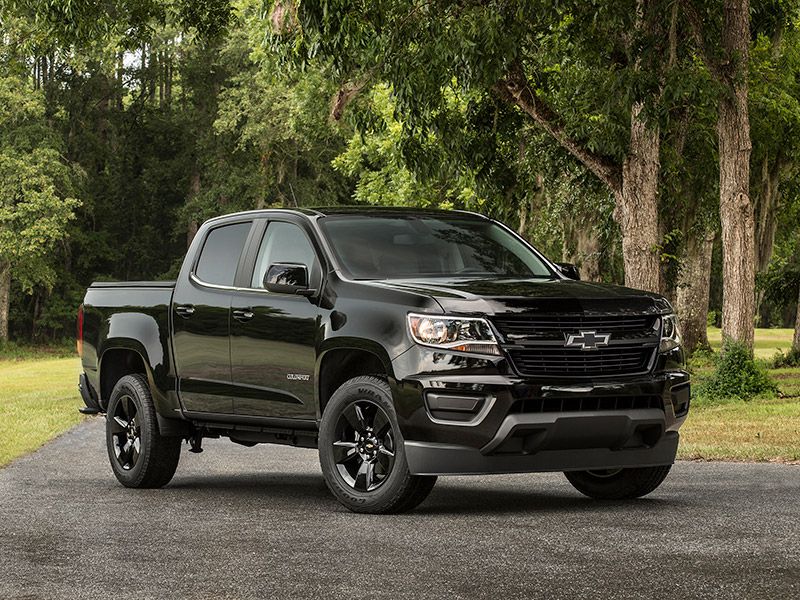
Photo by General Motors
Comfort and Amenities
When it comes to interior comfort and amenities the Honda Ridgeline comes out on top thanks to a car-like ride, comfortable seats, a very quiet interior, and some clever design elements like a "trunk" under the bed floor. There’s also plenty of storage under the rear seat (and even more with the rear seat folded up) and lots of space for rear-seat occupants, though the rear doors could open wider.
The Chevrolet Colorado offers significantly more front passenger space than the Ridgeline, though its rear seating is slightly tighter and not quite as comfortable. The interior of the Colorado is functional and logically laid out, but the materials aren’t nearly as nice as those found in the Ridgeline.
Honda Ridgeline
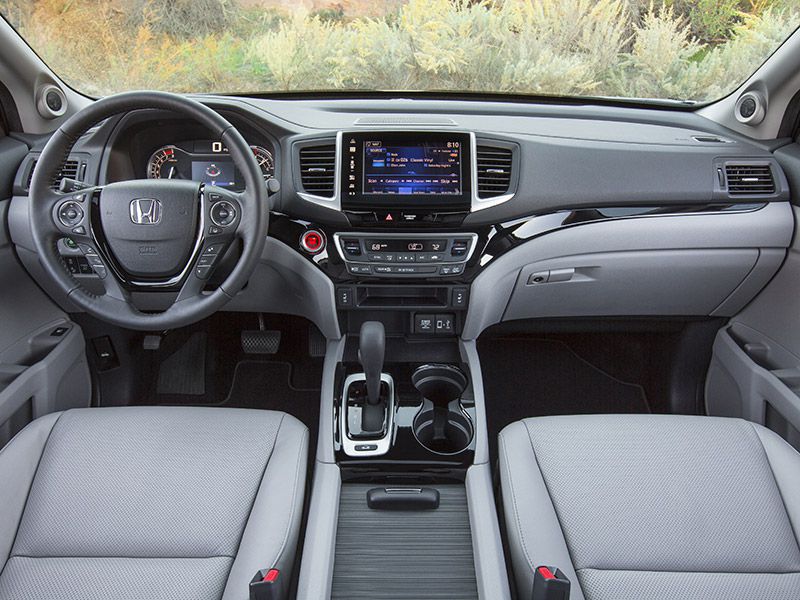
Photo by Honda
Hauling and Towing
Front-wheel drive models of the Honda Ridgeline have a maximum towing capacity of 3,500 pounds, while all-wheel drive models bump that up to 5,000 pounds and payload capacity is anywhere from 1,447 pounds to 1,580 pounds depending on the drivetrain and trim level. The Ridgeline’s bed does have 50 inches of space between the wheel wells and a nifty two-way tailgate that opens either traditionally or sideways like a door.
The Chevrolet Colorado can tow up to 7,700 pounds in rear-wheel drive configuration (with the diesel) and 7,000 pounds in four-wheel drive trim (with the diesel or V6), while payload is similar to the Ridgeline at 1,401 to 1,573 pounds, depending on the powertrain configuration.
Chevrolet Colorado
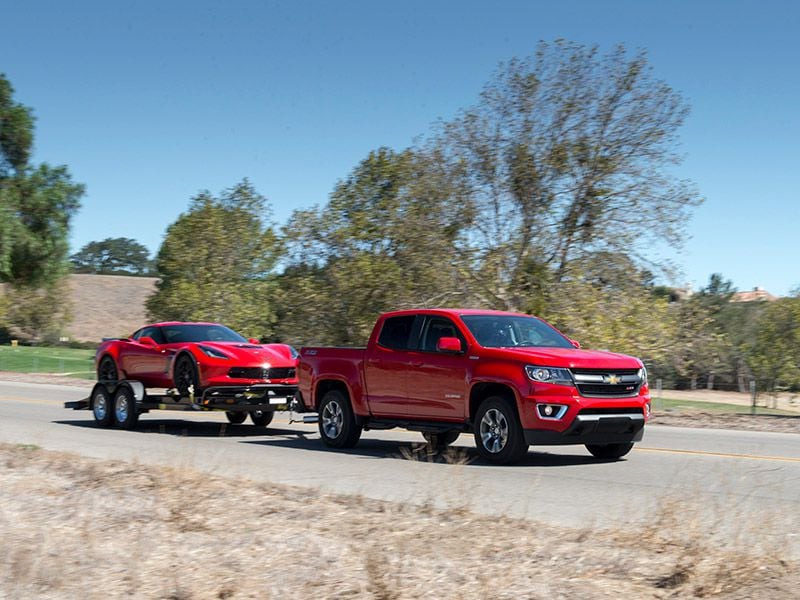
Photo by General Motors
Infotainment and Technology
Both the Honda Ridgeline and Chevrolet Colorado offer thoroughly modern infotainment systems, and both are available with auxiliary inputs, 8-inch screens, Bluetooth streaming, and Apple CarPlay and Android Auto support. But that’s where the similarity ends.
Where the Colorado’s MyLink system is easy and straightforward to use, the Ridgeline’s HondaLink system is slow and difficult to navigate. Thankfully, the Ridgeline’s steering wheel controls are easier to use than the touchscreen, but while they decrease the number of input errors, they don’t make the system any quicker to respond. In contrast, the Chevrolet MyLink system offers nice crisp graphics and an easy-to-use menu layout; responds to commands quickly; and boasts a 4G LTE wireless hotspot.
Chevrolet Colorado
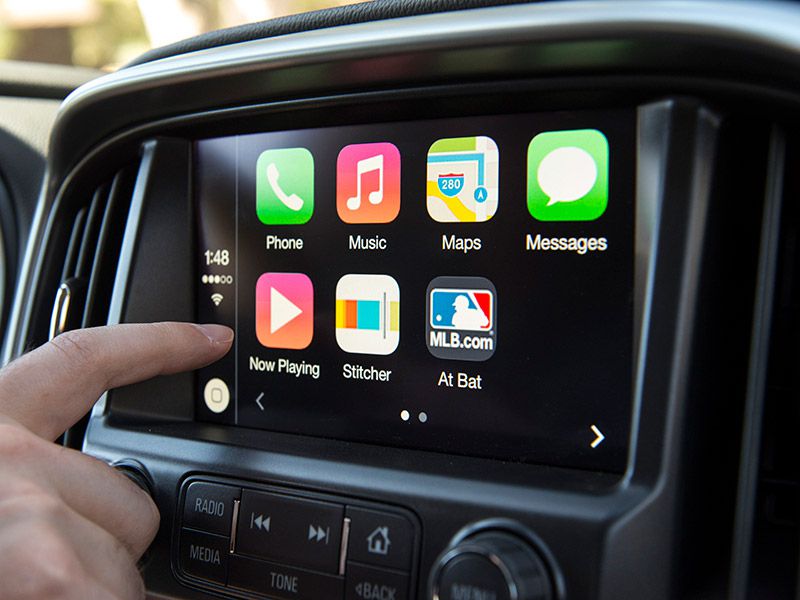
Photo by General Motors
Safety
The Honda Ridgeline is rated "Good" in every crash test by the IIHS, has "Superior" front crash prevention (with optional equipment) and "Good" headlights. In NHTSA testing it was given five stars in every category except for rollover resistance, for which it earned four stars.
The Chevrolet Colorado didn’t do quite as well. Extended-cab models scored "Acceptable" in the driver-side small overlap test and side impact test and "Good" in other tests by the IIHS, while the crew cab version scored "Good" in all tests. Both models have "Basic" front crash prevention and "Poor" headlights. The NHTSA scored all versions of the Colorado similarly, with four stars overall and in frontal crashes, five stars in side crashes, and three stars in the rollover-resistance evaluation.
Honda Ridgeline
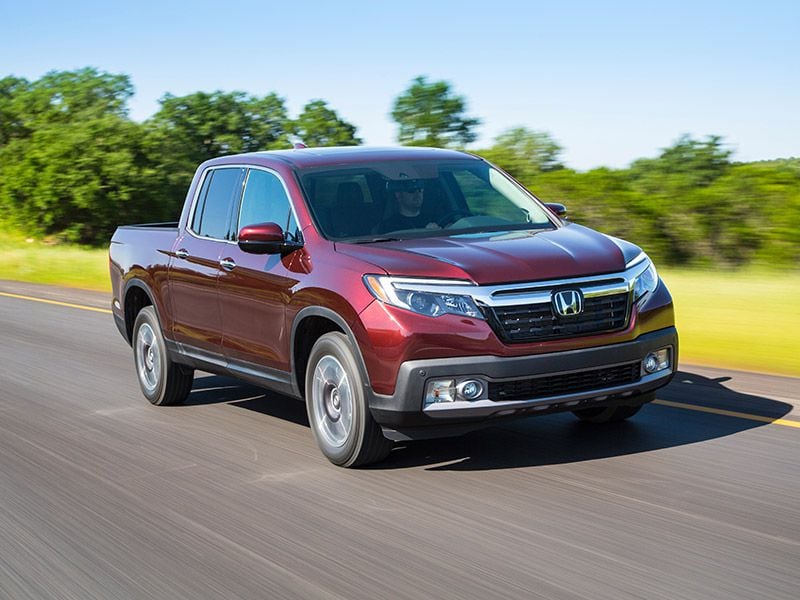
Photo by Honda
Driving Experience
On smooth pavement where truck owners spend most of their time (or, for many owners, all of their time) the Chevrolet Colorado is comfortable enough and handles well for a truck, but the Honda Ridgeline is the clear winner with a car-like ride and a better driving experience. And despite being down on power, the Ridgeline is quicker than even the V6 Colorado.
When the going gets tough, however, the story changes, with the Colorado being much more competent off-road than the Ridgeline. For the minority of people who plan on doing lots of serious off-roading, the Colorado's ZR2 version can tackle trails that few other stock vehicles could while still being quite civilized on pavement.
Honda Ridgeline
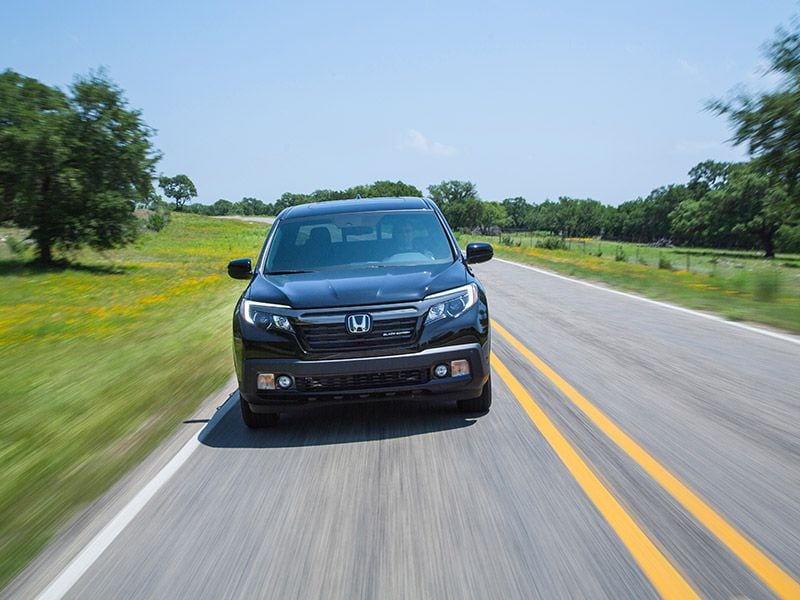
Photo by Honda
Pricing
The Honda Ridgeline starts at $29,990 for a front-wheel drive version and $35,290 for an all-wheel drive model. The top of the line Black Edition starts at $43,420 but includes just about every option under the sun, including all the expected active safety features and extras such as a three-zone climate control system and a heated steering wheel.
The Chevrolet Colorado starts at just $20,595 for a base rear-wheel drive version with a four-cylinder engine and manual transmission. A V6 automatic rear-wheel drive model starts at $25,735, and a four-wheel drive V6 starts at $29,885. Top-of-the-line ZR2 versions come in at $40,400 for a V6, and opting for the diesel adds $3,500 to the price.
Chevrolet Colorado
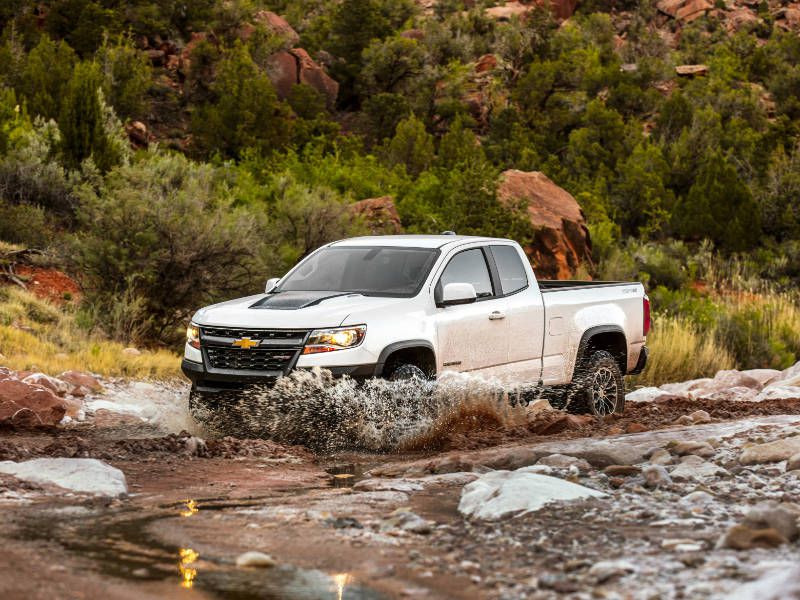
Photo by General Motors
The Verdict
The Honda Ridgeline and Chevrolet Colorado have two widely different takes on the compact pickup truck, and by now you probably know which of the two is right for you. If you spend most of your time on the road or plan on using your truck as your daily commuter, then the Ridgeline is probably your better pickup. If you regularly tow a moderately heavy trailer, go off-road, or are otherwise planning on using your pickup the way a pickup was intended to be used (though they’re seldom used that way), then the Colorado is probably the better option.
To put it succinctly, the Ridgeline is the better vehicle, but the Colorado is the better truck.
Chevrolet Colorado
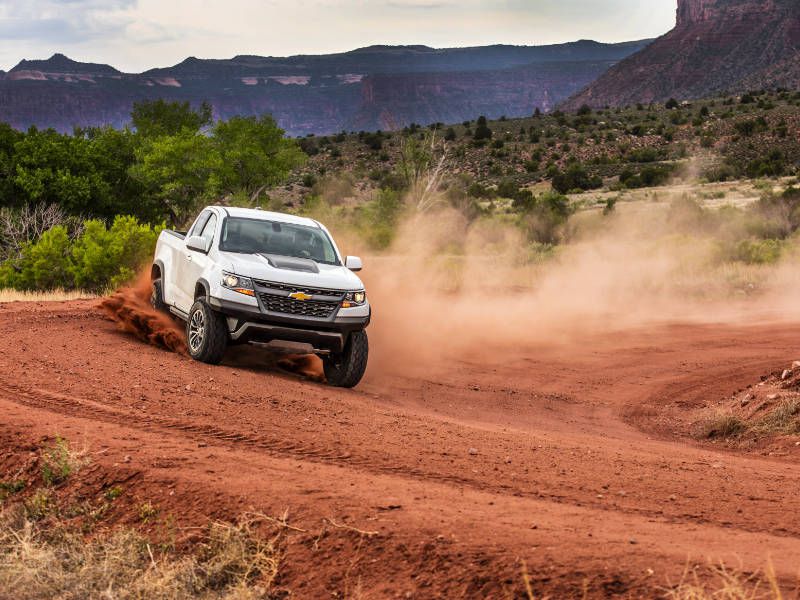
Photo by General Motors